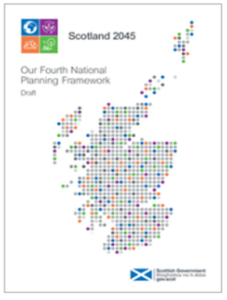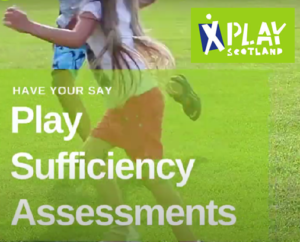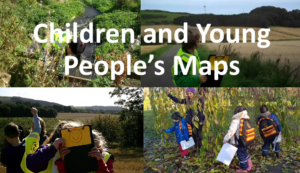

 Hello. I’m Maggie and I’m six months old. I’ve just heard about Scotland’s National Planning Framework (NPF4 for short because it’s the fourth one they’ve done). It’s really interesting when you get the hang of it…
Hello. I’m Maggie and I’m six months old. I’ve just heard about Scotland’s National Planning Framework (NPF4 for short because it’s the fourth one they’ve done). It’s really interesting when you get the hang of it…
NPF4 is all about making Scotland an even more brilliant country by 2045. I’ll be 24 in 2045 (all being well) … so NPF4 is really important for me and all the other little children.
There’s a consultation on it for everyone to join in, which is good, isn’t it? Trouble is, I can’t talk yet … so I’ll need other people to put my case for me. It’s very easy. I can sum it up in four words: I WANT TO PLAY.
There’s this voice inside me that keeps saying I WANT TO PLAY very loudly all the time. I’m sure it’s right because playing is just the best thing in the world. It helps me find things out, like how to use my body effectively, and how to get along with people, and how the world works, and how to solve problems and … well, everything really.
And PLAY fits in very well with NPF4’s four criteria:
1. Sustainable Places. Playing outdoors in nature is lovely fun and it makes me want to help the world stay lovely – so play is great for sustainability.
2. Liveable Places. For neighbourhoods to be ‘liveable places’ for children, they need plenty of exciting places for children to play. We want to be part of the community and get to know our neighbours and neighbourhood, so it has to be safe to play out too. (Without the grown-ups, if possible. I can’t walk yet so have to rely on my parents to get around but I’d like be more independent as soon as I can.)
3. Productive Places. My granny says that, according to the World Economic Forum, lots of play while I’m little will make me a really productive member of the future workforce. Hooray!
4. Distinctive Places. I’m told there are lots of these in Scotland – cities, towns, mountains, lochs… Can’t wait to visit them all. But what would make them even more distinctive? Lots of interesting spaces where Scottish children can play. YAY!
Putting the play into planning
SO… we must write PLAY into this NPF4 thing – loud and clear. There is a new law that all children have enough places to play, especially outdoors (as often as possible in nature) and near to where they live. According to granny, provision for good playing places has to be a ‘statutory duty’ for our local authorities. (‘Statutory‘ means it’s the law.)
 Granny says a brilliant organisation called Play Scotland have helped to fix it so local authorities (LAs) must do something called a Play Sufficiency Assessment, to go in an Evidence Report for their Local Development Plan. The LAs have a statutory duty to ‘take full account’ of the Evidence Report, which includes making sure there’s enough play for all the children!
Granny says a brilliant organisation called Play Scotland have helped to fix it so local authorities (LAs) must do something called a Play Sufficiency Assessment, to go in an Evidence Report for their Local Development Plan. The LAs have a statutory duty to ‘take full account’ of the Evidence Report, which includes making sure there’s enough play for all the children!
Three cheers for Play Scotland! When I grow up I shall join them.
But there’s a problem. People working in LAs are all grown-ups … and would someone who wears a suit and sits at a computer all day know what makes a good play space? Or how much space children need to play properly? Or what makes play easy to access? No, of course not. Only CHILDREN know that. So the LAs need CHILDREN to give them the evidence for their Play Sufficiency Assessments.
 This is why I’m calling on big children (i.e. about three-year-olds upwards) to provide this evidence. The big children will need grown-ups to help them because there’ll be forms to fill in and emails to write and that. But there are lots of sensible grown-ups out there. Granny showed me a blog written by one of them – great pictures!. She also told me about an article that says ‘Young children are intuitive urban planners – we would all benefit from living in their care-full cities’. Right on!
This is why I’m calling on big children (i.e. about three-year-olds upwards) to provide this evidence. The big children will need grown-ups to help them because there’ll be forms to fill in and emails to write and that. But there are lots of sensible grown-ups out there. Granny showed me a blog written by one of them – great pictures!. She also told me about an article that says ‘Young children are intuitive urban planners – we would all benefit from living in their care-full cities’. Right on!
Incidentally, granny’s also mad on something called the UNCRC, about children’s rights (I love this film about children’s right to play). And the UNCRC should soon be part of Scottish law, so people in the LAs will have to listen to what children say. Yippee!
Ask the experts!
 Come on then, all you sensible grown-ups. Please help the real play experts (CHILDREN) do Play Sufficiency Assessments on the places where they spend their days. That’s nursery/school and their local area.
Come on then, all you sensible grown-ups. Please help the real play experts (CHILDREN) do Play Sufficiency Assessments on the places where they spend their days. That’s nursery/school and their local area.
What’s good and bad from a play point of view? How could it be better? Children probably have different ideas at different ages but I reckon the ones who know most are us little children because that ‘I want to play!’ voice inside us is really loud when you’re little.
Granny says the ‘I want to play!’ voice is children’s inbuilt learning drive, because play is how we’re born to learn. There’s a book about it called Play is the Way with a great picture on the cover. The lady who runs Play Scotland wrote a chapter in it, and so did another lady (from Children’s Parliament) who knows all about children’s rights.
For instance, Play is the Way says young children find it hard to sit down all the time, so wouldn’t it be better if their nursery or classroom had access to the outdoors all day long? Early years children have strong views about that! And also about what’s fun in the playground and what isn’t…
 Maybe you can also help children check out the local area. The NPF4 has this idea of ‘the 20 minute neighbourhood’ (can people find everything they need within a 20 minute radius of home?). So, go for a walk with the children for 20 minutes and let them tell you where the good play places are… and where there could be more (e.g. there’s some derelict land near us that would make a great place to play if someone just tidied it up a bit). Granny says Jenny Wood from APIC (A Place in Childhood) has great ideas about checking this stuff out.
Maybe you can also help children check out the local area. The NPF4 has this idea of ‘the 20 minute neighbourhood’ (can people find everything they need within a 20 minute radius of home?). So, go for a walk with the children for 20 minutes and let them tell you where the good play places are… and where there could be more (e.g. there’s some derelict land near us that would make a great place to play if someone just tidied it up a bit). Granny says Jenny Wood from APIC (A Place in Childhood) has great ideas about checking this stuff out.
Call to Action!

 So here’s my personal call to action. Pleeeeease, all you sensible grown-ups, pleeeease will you engage with children of three and over to do to respond to two consultations:
So here’s my personal call to action. Pleeeeease, all you sensible grown-ups, pleeeease will you engage with children of three and over to do to respond to two consultations:
– the NPF4 (Draft) consultation
– the PSA guidance consultation, specially about Play Sufficiency Assessments.
The kind people at Play Scotland have created an information pack to make it easy for you – just email info@playscotland.org. There’s a pro forma for your evidence report and all you have to do is fill it in, then email it back to them by 31-3-22. They will then forward it to the relevant consultation teams,
(Oh, and if you can, it would really help if you emailed a copy to your MSP too.)
But the deadline (see above right) is getting closer every minute. So please could you start NOW?
Thank you for taking the time to read my blog. My dinosaur and I love you for it.
Note from Upstart: An online discussion featuring Maggie will be held on 8th March – Eventbrite link here.


